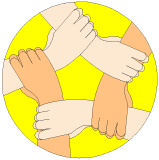
At Palo Alto College multiple volunteer and community service opportunities are available through the classroom.
Janet Rangel is a counselor and instructor of Psychology at Palo Alto. She offers her students the chance to participate in community service projects to
benefit their community and earn a grade
for their services. In October, her classes took a field trip to San Pedro
Park with children from the SAMM Shelter.
Alex Esquivel, a Pre-Nursing major who participated in the field trip said,
“It was fun, and I would do it again.”
Rangel’s Psychology class has
also teamed up with the American Red Cross and sponsored a coin collection drive.
Students collect coins off campus where all donations will be given to the hurricane
victims in Florida at the end of November.
“It feels good to help others,” said Elvia F. Martinez, a Pre-Nursing
major at Palo Alto. Martinez also helped coordinate the collection drive for
the classes. From watching the news, she realized that these victims were in
great need of help.
“I know if we had a tragedy, we would appreciate others who volunteer to
help,” said Martinez.
The Corporation for National and Community Service also provides the chance
for Americans of any age and background to volunteer time to their country.
According to their website, www.nationalservice.org,
there are three programs to choose from: Senior Corps, AmeriCorps and Learn
and Serve America.
SeniorCorps provides experience of more than 500,000 Americans who are age 55
and older. Various programs are set up to help serve and protect their community,
with everything from safety patrols to helping seniors maintain independence
in their homes.
AmeriCorps assists the community through many organizations such as Habitat
for Humanity, the American Red Cross and Boys and Girls Club of America. In
exchange for a year of service, members earn up to $4,725 for their college
education. Half of the members receive living allowance and benefits when they
serve.
The Learn and Serve America program provides schools and colleges with grants
to engage students in community service while gaining academic achievement in
the classroom.
In 2000, the Alamo Community College District received a grant from the Corporation
for National Service to help create a Service Learning program at the four colleges.
“You live the learning, and it stays with you throughout your life,”
said Mariana Ornelas, Assistant Professor of Humanities and IDST at Palo Alto.
“By combining both, students participate in their community and understand
why it’s important to be involved.”
Palo Alto offers courses where service learning is applied. Ornelas teaches
IDST 2370: Individual, Family & Community and IDST 2371: Society and Social
Issues. Both courses offer this type of mentorship from the instructors where
students can apply their education in the community where they live. IDST 2371
focuses on Chicana women so that students may gain an appreciation of the role
that these women play in our community. As a semester project, students are
encouraged to interview and research local Chicana professionals in the San
Antonio area.
“I strongly believe in this kind of learning,” said Ornelas. “Students
are able to see the concepts of classroom learning and how it applies to the
real world.”
The Criminal Justice Department also applies this type of learning with their
students. Each student in the class has the opportunity to tie their volunteer
work in with their career goal.
“I want each student to have a better understanding how the correctional
systems operate,” said Steve Mardock, assistant professor of Criminal Justice
at Palo Alto. Each student may intern at probation departments or the Bexar
County District Attorney’s Office, depending on which class they are taking.
Some students who have volunteered at various facilities have been offered jobs.
While others have found that this was not the career of their choice, they did
learn from the experience of community service.
The desire to make positive changes in this world starts with local community
service.
For more information about professors who offer Service Learning opportunities
in their classes, contact Dr. Thomas Baynum, Vice President of Academic Affairs,
at 921-5533 or <tbaynum@accd.edu>.